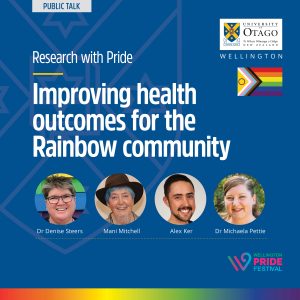Research with Pride
It is wonderful to see the University of Otago Wellington taking part in PRIDE week with this Research with Pride event.
More details about these fantastic speakers and registration details can be found here: Read more about our speakers
Primary care rainbow consultation videos
An outcome of the two research projects below is this video demonstrating some rainbow health related consultations: https://youtu.be/H9kcpu0URBs
Rainbow young people’s recommendations for healthcare providers
Participants in our study made the following recommendations for healthcare providers:
Let conversations around our gender and sexuality be led by us.
Listen to and believe young people; take their lead about their health needs and goals.
Learn some basics about rainbow health so that we don’t feel we need to educate you.
You don’t need to know everything but take time to learn the basics. If you are unsure, be honest and say that you will find out, or use a partnership model (“let’s find out together”).
Respect our gender or sexuality.
Try to avoid heteronormative and cisnormative language, making assumptions and misgendering people (e.g., if you don’t know someone’s gender/pronouns use neutral terms like they/them).
Provide services that are responsive to our needs.
Undertake a co-design or consultation process with young people when services are being developed.
Take the time to build trust with us.
Making time to undertake whakawhanaungatanga or introductions is critical to building trust with young people. It takes time and practice to do this well. Trust is foundational to facilitating disclosure.
Maintain our right to privacy.
Communicate what confidentiality means at several points during the consultation and how this applies to sharing/not sharing with parents. Clarify the situations in which confidentiality can be broken and when disclosure has to occur.
Check in if it’s okay to ask about something before asking and explain why you are asking.
E.g. Explain that all young people are offered opportunistic STI screening (due to high rates of asymptomatic infection).
Rainbow Young People’s Experiences of Primary Care in Aotearoa New Zealand
“We Just Want to Be Treated Normally and to Have That Healthcare That Comes along with It”: Rainbow Young People’s Experiences of Primary Care in Aotearoa New Zealand
We are delighted to have published this research in the Special issue LGBTQ+ Youth: Experiences, Needs and Aspirations.
https://www.mdpi.com/2673-995X/2/4/49
Our paper is titled: “We Just Want to Be Treated Normally and to Have That Healthcare That Comes along with It”: Rainbow Young People’s Experiences of Primary Care in Aotearoa New Zealand. We held focus groups with rainbow young people in Aotearoa New Zealand to explore experiences of engaging with primary care.
We identified four main themes were identified:
(i) anticipated and enacted discrimination,
(ii) building trust,
(iii) confidentiality
(iv) healthcare provider knowledge and competence.
Participants spoke of some positive experiences but perceived these to be lucky or surprising, with most also having encountered less supportive interactions and heteronormative views. Visual indicators of rainbow-friendliness in clinic settings were appreciated only if affirmed by inclusive and accepting practice. Frustrations were expressed about gaps in provider knowledge and the sense of having to educate clinicians about rainbow-specific health issues. Primary care providers can facilitate positive consultations with rainbow young people by using clear communication to build trusting relationships, and by being accepting, non-judgmental and transparent about confidentiality.
Fifth year medical students’ education, confidence and learning needs related to healthcare provision for sexual and gender minority patients
This short research report was recently published in the Journal of Journal of Primary Health Care.
https://www.publish.csiro.au/HC/HC22082
This study surveyed fifth-year medical students at the University of Otago Wellington (UOW) about confidence in providing health care to lesbian, gay, bisexual, transgender, queer, intersex and asexual (LGBTQIA+) patients to identify learning needs.
We found that medical students view LGBTQIA+ health care as an important topic and want opportunities to improve knowledge and confidence in this area. Students lack confidence in consulting with LGBTQIA+ patients, suggesting that more education focused on practical experience and interactions with real patients would be of benefit.
Welcome
Welcome to this blog. I will be using this page to keep you updated about the rainbow health research and projects from the Department of General Practice and Primary Health Care at the University of Otago Wellington.
I hope you find it useful and interesting
Ngā mihi nui
Rona
Dr Rona Carroll


